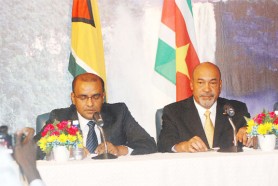A meeting here yesterday between President Bharrat Jagdeo and his Surinamese counterpart Desi Bouterse saw an agreement to conduct a feasibility study into bridging the Corentyne River, as both countries pledged to pursue a closer working relationship.
Bouterse, who was recently elected President, was on a one-day state visit to Guyana and plugged for a new mechanism to be developed which would accelerate development initiatives between the two countries, such as the bridging of the Corentyne River. This river separates Guyana and Suriname. He said this new mechanism would see groups within the foreign ministries of both countries reporting directly to the President. This, he opined, would ease the bureaucracy of the process.

At a joint press conference held at the Office of the President, Jagdeo said the bridging of the Corentyne River has been a project discussed for a long time. He said that at the level of UNASUR, this bridge had been identified as one of a series of projects that would “further physically integrate” South America. During his presidential campaign, Bouterse had promised to build a bridge across the Corentyne River should he be elected.
Jagdeo said that if the countries were to depend only on the multilateral framework, it would take a long time so it was decided that this would be approached on a bilateral level. According to him, the feasibility study would not only look at the cost of the project but also at its likely development impact.
Asked about the timeline for the completion of the study and funding, President Jagdeo said this had not been settled as yet. “We have not set any timeline. What we agreed is that… we should be effective, we should be concrete and there is urgency about this task,” he said. “So we hope that the renewed mechanism, will get together, not like in the past where the joint commissions met occasionally, rarely and the discussions were mired in democracy… that we would meet soon to advance the technical work in all of these areas.”
According to the Head of State, it is necessary that technical assessments be done before the project is concretized. “There is quite a bit of technical work to be done. So we anticipate… urgent movement in these areas. But we don’t want to be accused of not doing the technical work too…,” he said.
Jagdeo said once these studies are done, the issue of finances would be dealt with as constant contact will be maintained between the respective Offices of the President.
President Bouterse, speaking through an interpreter, described the project as one that is of “vital importance” and said the most important part of this process was the “political will”. He said once this element is there other things will fall into place, including finances.
Meanwhile, Jagdeo said he supported Bouterse’s push for a new mechanism, saying that in the past the joint commission was not the best approach because it did not have enough high level political attention. He said the new mechanism will see his office and Bouterse’s office directly overseeing the co-operation process.
“We agreed that borders are important. But we agreed to a changed philosophy; that we need to put our relationship beyond just the border issues that we have had,” Jagdeo said. “We’ve found out that the border issues in the past have often overshadowed and stymied co-operation in every other area. And there [are] so many things that we can do together because of geography, because of synergy, that would be good for the people of Suriname and the people of Guyana and for our joint development. So while borders are important, and the border issues are important… we insisted and we agreed that the engagements in the future would put our relationships beyond those as we seek to accelerate the process.”
Meanwhile, in response to a question, Jagdeo said that it should not be the case where the two countries wait on the construction of the bridge to improve relations at the border. “I think this is critical now that we expand and make things easier for people and goods to travel,” he said. “We have commissioned a study about the bureaucracy on our side… to ensure that it isn’t excessive.” He said too that at yesterday’s meeting they explored an increase in frequency of the operation of the ferry between the two countries.
Issues such as climate change, crime and security, health, information technology, fisheries, agriculture, energy, mining, and tertiary education were also discussed yesterday when the two Presidents met.





